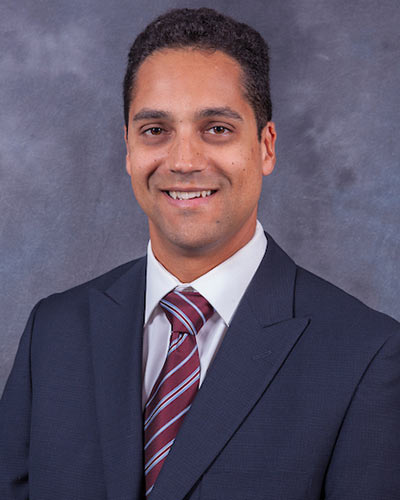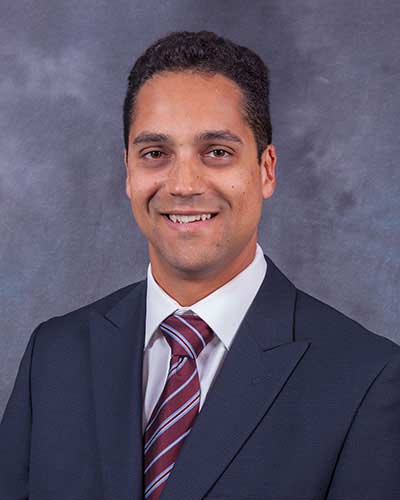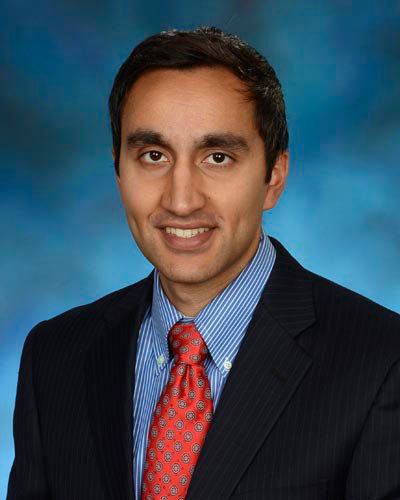November 21, 2017 | David Kohn

Federally Funded Projects Worth More Than $14 Million Over Two Years
University of Maryland School of Medicine (UM SOM) researchers have been awarded more than $14 million to carry out two research projects to investigate the best way to prevent infections that can occur during the surgical treatment of fractures.
The funds come from the Patient-Centered Outcomes Research Institute (PCORI), the Department of Defense, Physicians’ Services Incorporated Foundation, and McMaster Surgical Associates. The research includes two projects.
The projects will be led by Gerard Slobogean, MD, MPH, an assistant professor of Orthopaedics at UMSOM, and the assistant director of clinical research for the Department of Orthopaedics.
Each year, more than a million Americans suffer a broken bone in the arm, leg, or pelvis that requires surgery. Approximately 50,000 of these patients develop a surgical site infection. The cause of these infections is complex. The source of bacteria could be the patient’s skin, the injury environment, or from the hospital.
The Program of Randomized Trials to Evaluate Pre-operative Antiseptic Skin Solutions In Orthopedic Trauma (PREP-IT), which received more than $14 million, will examine the effect of alternative skin preparation solutions on surgical site infections in fracture patients in two large clinical trials.
The Pragmatic Randomized Trial Evaluating Preoperative Alcohol Skin Solutions in Fractured Extremities (PREPARE) trial was awarded $10.9 million from PCORI, and will compare two pre-operative alcohol skin solutions, chlorhexidine gluconate and iodine-povacrylex, to see which one is more effective against infections after fracture-related reoperations. This study will recruit 7,820 participants from sites in Canada and the United States.
The Pragmatic Randomized Trial Evaluating Preoperative Aqueous Antiseptic Skin Solutions in Open Fractures) trial (Aqueous-PREP), which has received over $3.2 million in funding from the Department of Defense, Physicians' Services Incorporated Foundation, and McMaster Surgical Associates, will recruit 1,540 participants with fractures treated operatively at clinical sites in Canada and the United States. It will compare the effect of aqueous pre-operative antiseptic skin preparation with 10 percent povidone-iodine versus 4 percent chlorhexidine gluconate on the incidence of infections and fracture-related reoperations.
The PREP-IT program will be jointly coordinated by the R Adams Cowley Shock Trauma Center at the University of Maryland Medical Center and Center for Evidence-Based Orthopaedics at McMaster University.
“For years there has been a controversy over the most effective strategies to reduce infection after fracture treatment,” said Dr. Slobogean. “This research will help us identify the safest and most efficient techniques, and will likely help to substantially reduce the morbidity of surgical site infections.”
Many clinical studies test whether a treatment works under ideal conditions in specialized research centers, but health care is rarely delivered in such idealized situations and settings. These studies will test the treatments’ effectiveness in real-life clinical situations and also can include a wider range of study participants, making their findings more generally applicable.
PCORI is an independent, nonprofit organization authorized by Congress in 2010. Its mission is to fund research that will provide patients, their caregivers, and clinicians with the evidence-based information needed to make better-informed healthcare decisions.
Twenty clinical sites across North America will participate in the studies. The research will begin in the spring of 2018.
The multidisciplinary team of co-investigators includes multiple patient partners, Robert V. O’Toole, MD, the Hansjörg Wyss Medical Foundation Endowed Professor in Orthopaedic Trauma, Anthony Harris, MD, MPH, a professor of epidemiology & public health, and Manjari Joshi, MBBS, an associate professor of medicine, and Daniel Mullins, PhD, a professor in the University of Maryland School of Pharmacy.
“Our faculty have become international leaders in this area of research,” said UMSOM Dean E. Albert Reece, who is also Vice President of Medical Affairs, the University of Maryland and the John Z. and Akiko Bowers Distinguished Professor at UM SOM. “This impressive grant will allow them to continue that leadership and will ultimately help improve care for thousands of patients both nationally and internationally.”
About the University of Maryland School of Medicine
Commemorating its 210th Anniversary, the University of Maryland School of Medicine was chartered in 1807 as the first public medical school in the United States. It continues today as one of the fastest growing, top-tier biomedical research enterprises in the world -- with 43 academic departments, centers, institutes, and programs; and a faculty of more than 3,000 physicians, scientists, and allied health professionals, including members of the National Academies of Science, Engineering and Medicine, and a distinguished recipient of the Albert E. Lasker Award in Medical Research. With an operating budget of more than $1 billion, the School of Medicine works closely in partnership with the University of Maryland Medical Center and Medical System to provide research-intensive, academic and clinically-based care for more than 1.2 million patients each year. The School has over 2,500 students, residents, and fellows, and nearly $450 million in extramural funding, with more than half of its academic departments ranked in the top 20 among all public medical schools in the nation in research funding. As one of the seven professional schools that make up the University of Maryland, Baltimore campus, the School of Medicine has nearly 7,000 total employees. The combined School and Medical System (“University of Maryland Medicine”) has a total budget of $5 billion and an economic impact of nearly $15 billion on the state and local community. The School of Medicine faculty, which ranks as the 8th-highest public medical school in research productivity, is an innovator in translational medicine with 600 active patents and 24 start-up companies. The School works locally, nationally, and globally, with research and treatment facilities in 36 countries around the world. Visit medschool.umaryland.edu/
Learn More
• Department of Orthopaedics
• R Adams Cowley Shock Trauma Center
• Center for Evidence-Based Orthopaedics at McMaster University
Contact
Department of Anesthesiology
(410) 328-6120 (phone)
(410) 328-5531 (fax)
swalsh@som.umaryland.edu
University of Maryland School of Medicine
David Kohn
Director of Medicine and Science Communications
University of Maryland School of Medicine
Office of Public Affairs
dkohn@som.umaryland.edu
(410) 706-7590
Related stories

Wednesday, January 31, 2024
Large Multicenter Clinical Trial Finds that Antiseptic Containing Iodine Reduces Surgical-Site Infections in Patients with Extremity Fractures
A large multicenter clinical trial co-led by University of Maryland School of Medicine researchers found that an antiseptic containing iodine resulted in about one-quarter fewer post-surgical infections in patients with limb fractures compared to another frequently used skin antiseptic. The results of the study of nearly 8,500 patients across the United States and Canada were published today in the New England Journal of Medicine.

Thursday, October 13, 2022
Two Antiseptics Work Equally Well to Prevent Infections After Fracture Surgery
A randomized clinical trial involving more than 1,600 patients with open fractures found that two antiseptic solutions routinely used by surgeons prior to fracture surgery are equally effective for preventing post-surgical infections. Based on the results of this trial, the study leaders from the University of Maryland School of Medicine (UMSOM) and McMaster University concluded that orthopedic surgeons could select either of the two solutions -- aqueous 10% povidone-iodine or aqueous 4% chlorhexidine gluconate – for infection prevention.

Tuesday, December 05, 2017
University of Maryland School of Medicine Orthopaedic Surgeons to Receive Prestigious International Research Award
A research team led by Mohit N. Gilotra, MD, assistant professor of orthopaedics at the University of Maryland School of Medicine (UMSOM), will receive the prestigious 2018 Charles S. Neer Award from the American Shoulder and Elbow Surgeons (ASES) for a clinical study that demonstrated an effective method to potentially reduce the risk of serious infection following shoulder surgery.
